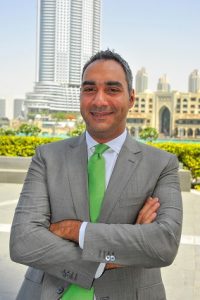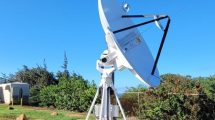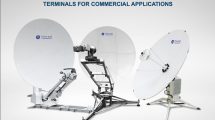 Across the Middle East and Africa, industry players have to rely on importing antennae. This is because technological advances need to be made before the manufacturing know-how is acquired in these regions, and manufacturers aren’t interested in bringing their technology here for production, says Ahmed Hassan, CEO of Wiseband.
Across the Middle East and Africa, industry players have to rely on importing antennae. This is because technological advances need to be made before the manufacturing know-how is acquired in these regions, and manufacturers aren’t interested in bringing their technology here for production, says Ahmed Hassan, CEO of Wiseband.
Buying an antenna from abroad comes with additional costs. Not only do you pay the antenna itself, but you face import duties, shipping costs and you have to wait for it to arrive. It was these factors that facilitated Hassan’s plan of selling franchises for auto-deploy antennae. Receiving the materials, training and software needed to build, use or resell an antenna right at your doorstep means that customers save money and time. When you consider all the costs involved in importing an antenna, the amount for the end user is considerably higher than the price of an auto-deploy kit, says Hassan.
While the region may not be advanced in antenna technology at present, this does not reflect satellite-related activity or demand for high-quality equipment and products.
“If you look around the Middle East and consider Yahsat’s satellites being launched and its ground segment in Abu Dhabi, as well as Qatar’s launching of its communications satellites, you must realise that there is going to be huge demand for high-quality antennae here.”
While there is a gap in the market for auto-deploy antenna kits in the Middle East, other markets are of particular interest to Hassan, citing heavy import taxes and major events as some of the reasons.
“In addition to the selling price, consider the other costs involved with an antenna made in America, for example. It’s going to cost you about USD 3,500 just for air shipping and you still have concede the import taxes involved on top of everything else. Brazilian import duties, for example, nearly double the ownership cost. Now, Brazil will be a huge market because of the World Cup and Olympics, but with that kind of tax on top of all other costs, that’s a major problem for them.
UAE market, costs and benefits
Despite other markets being attractive, the UAE, is potentially a very strong market, says Hassan, explaining that the laws of the country are very favourable.
“Demand within the UAE is fueled by the laws protecting local industries: if you want to buy something and it’s produced in the country, then you have to buy it from the company manufacturing it here. If it’s not made here, then you’re free to purchase it from outside the country. So, if a UAE-based company has the technology and production capability to make antennae in-country, then it means they’re guaranteed a market share.
“For a good quality auto-deploy antenna, you’re talking about USD 15,000-30,000 depending on whether it’s vehicle-mount or fly-away, ku or ka band, VSAT or SNG application. This broad product range and landed cost is a big barrier to acquire a significant portion of the market. So we are offering a range of high-quality, auto-deploy products at a low-cost. From a commercial point of view, we’re cutting the shipping costs and, most of all, the tax. Not to mention the new high-tech job opportunities that this creates. Technical and customer support is also going to be local for all customers with one of our antennae. If there happens to be some problem, support will come to the customer; the customer will not have to ship it abroad to have it repaired or worked on. Having to send your antenna somewhere else not only costs money but it costs you in time as well – you’re looking at around five to six weeks for a typical repair that has to be returned to the factory.”
Franchising
The franchise guarantees a multi-year technology and production licence with regional protection and insurance and technology updates every 24 months, says Hassan.
“With this licence, we are committed to providing a new-generation antenna every two years. Insurance is also taken care of; our franchise contract guarantees that the antennae will work and will be accepted by all satellite operators. Our products have gone through quality assurance and approvals, and we can control quality builds through our two-month, mandatory production training.”
To begin, Hassan and his team knew that they wanted a state-of-the-art product while maintaining a low-cost price. While developing this idea, they came up with the McDonaldesque concept.
“We decided we’d sell the ‘recipe’; the ingredients and the step-by-step know-how, so to speak. We also decided that this antenna could be used by anybody and in every vertical market; we’d not be limited to supplying the government or military, or broadcasters. So we were going to change the idea of auto-deploy antennae and how it was going to be sold and distributed. To do this and in turn penetrate a bigger market share, we’d have to change the mentality of the market. We then came up with the plan to sell a franchise. With this comes the capital equipment necessary for manufacturing the antennae, the training, the source code and the kits, which contain all the needed material and parts for assembly.
“To date, we have invested a few million dollars in the project and expect to recoup our engineering investment with just a few franchises sold. The royalties will ensure the design, production technology, branding and future technology roadmap is strong for all franchise owners for the lifetime of the contract.”
The team behind this consists of a 20-man outfit with people from a variety of countries, says Hassan, adding that they are the ones responsible for everything from the development to the training, technical support and brand.
Special software
“A dedicated development team is responsible for our antenna control software, which is the most crucial part of a highly reliable satellite acquisition. The software is custom-designed internally by programmers who understand satellite acquisition, and it utilises the latest in digital technology and user interfaces. In addition to auto acquire logic, the antenna has built-in regional operation controls to insure the franchise territory is protected.”
Hassan attributes a lot of what has been achieved to this “good team”.
“There is a lot of know-how today. Look around at how many companies are involved in VSAT currently and we’re far from the only ones offering auto-deploy antennae. It’s not necessarily a matter of capital. It’s about putting together a good team and combining great engineering and manufacturing technology with an effective go-to-market strategy.”
In addition to the custom-built software, which was the biggest challenge, Hassan notes others that had to be overcome, namely international standards for manufacturing processes, documentation, production tooling that can be produced and deployed anywhere in the world at a reasonable cost, and the formal training for the production personnel that is included mandatorily with the licence.
Testing, approvals, delivery
Having been through a phase of prototyping and testing, the developed antennae then need to get approval from satellite operators, says Hassan.
“Our antennae are compliant with regulators such as FCC, ETSI and ITU, and meet the requirements for satellite operator approval. In addition, we plan to certify with the Global VSAT Forum approval programme. By the end of 2013, we will have acquired the approval from all major operators. We are expecting our first franchised antenna to be delivered in early 2014. This is our target date. We already have three franchises secured: two in Asia and one in South America, so it’s important to have the international type approvals.
“Getting approval from operators is critical and is a barrier to entry for other companies. Of course, you cannot transmit to a given satellite without the satellite operator’s approval; they must know and trust the make and model to ensure interference won’t be an issue. So without the certification, my antennae are useless. But this is good for us because our certification and approval programme will reflect our quality product. In fact, a competitive advantage that our antenna has is the approval of all relevant satellite operators.”
Around-the-clock support will be provided for customers in any location, says Hassan.
“We offer world-wide, 24/7 support. We have our own server and our own trouble-shooting tools, enabling us to be able to work from anywhere in the world at any time. This means that the time zones between Brazil and China, for example, aren’t a problem for us to provide support. We have sites in South America, Africa, Asia, China, the US and the Middle East.”














Add Comment